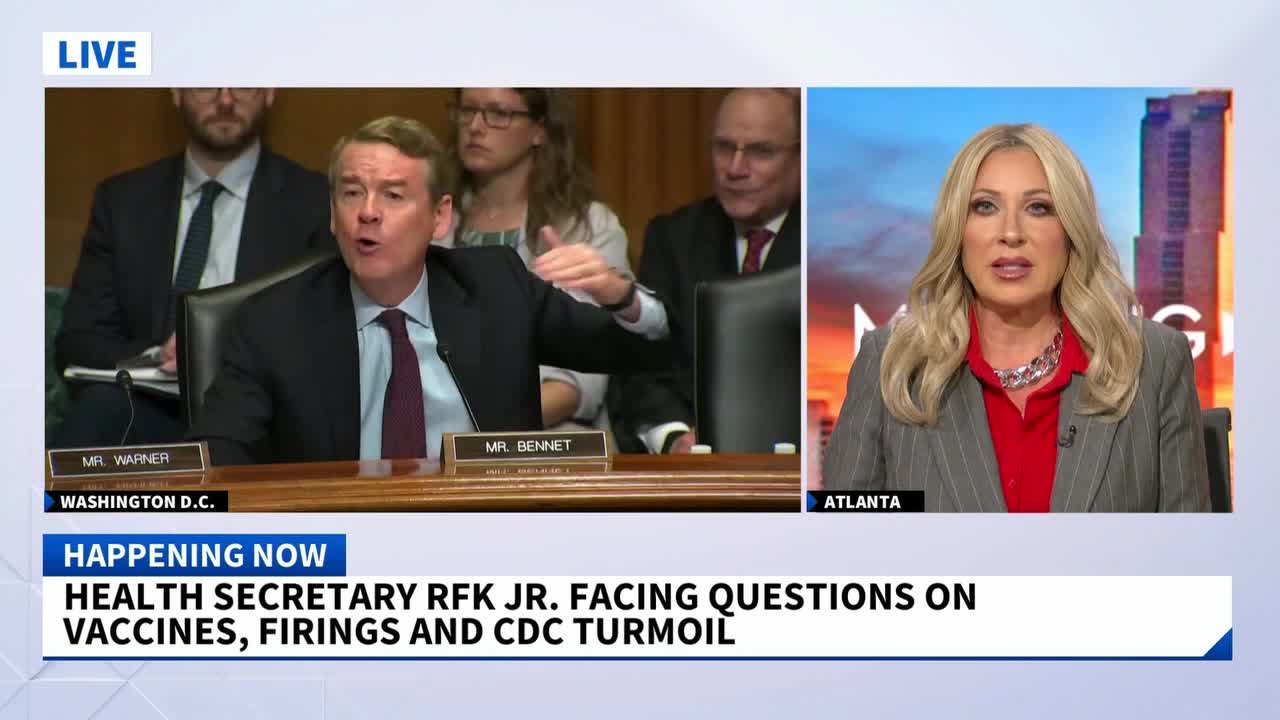WASHINGTON — U.S. Health Secretary Robert F. Kennedy Jr. came under pointed bipartisan questioning at a rancorous three-hour Senate committee hearing on Thursday, about — among other things — turmoil at federal health agencies and efforts to pull back recommendations for COVID-19 vaccinations.
Kennedy's exchanges with Democratic senators on the panel repeatedly devolved into shouting, from both sides.
But some Republican senators also expressed unease with his changes to COVID-19 policies.
The GOP senators noted Kennedy said President Donald Trump deserved a Nobel Prize for the 2020 Operation Warp Speed initiative to quickly develop mRNA COVID-19 vaccines, but that he also had attacked the safety and continued use of those shots.
"I can't tell where you are on Operation Warp Speed," said Republican North Carolina Sen. Thom Tillis.
Tillis and others asked him why the director of the Centers for Disease Control and Prevention was fired last week, less than a month into her tenure.
Kennedy said she was dishonest, and that CDC leaders who left the agency last week in support of her deserved to be fired.
He also criticized CDC recommendations during the COVID-19 pandemic tied to lockdowns and masking policies, and claimed — wrongly — that they "failed to do anything about the disease itself."
"The people who at CDC who oversaw that process, who put masks on our children, who closed our schools, are the people who will be leaving," Kennedy said. He later said they deserved to be fired for not doing enough to control chronic disease.
The Senate Finance Committee had called Kennedy to a hearing about his plans to "Make America Healthy Again," but Democratic senators pressed Kennedy on his actions around vaccines.
Sen. Ron Wyden of Oregon said Kennedy had "stacked the deck" of a vaccines committee, replacing scientists with "skeptics and conspiracy theorists."
He had tried to have Kennedy formally sworn in as a witness, saying the HHS secretary has a history of lying to the committee. The committee's chair, Sen. Mike Crapo of Idaho, denied the request, saying "the bottom line is we will let the secretary make his own case."
Last week, when the Trump administration fired the CDC's director less than a month into her tenure. Several top CDC leaders resigned in protest, leaving the agency in turmoil.
The ousted director, Susan Monarez, wrote in The Wall Street Journal on Thursday that Kennedy was trying to weaken public health protections.
"I was told to preapprove the recommendations of a vaccine advisory panel newly filled with people who have publicly expressed antivaccine rhetoric," Monarez wrote. "It is imperative that the panel's recommendations aren't rubber-stamped but instead are rigorously and scientifically reviewed before being accepted or rejected."
Kennedy told senators he didn't make such an ultimatum, though he did concede that he ordered Monarez to fire career CDC scientists.
Kennedy pushed back on concerns raised by multiple Republican senators, including Tillis and Sens. John Barrasso of Wyoming and Bill Cassidy of Louisiana. Both Barrasso and Cassidy are physicians.
Kennedy repeatedly pushed back against Democrats.
When Sen. Raphael Warnock questioned Kennedy about his disparaging rhetoric about CDC employees before a deadly shooting at the agency this summer, Kennedy fired back at the Georgia Democrat: "Are you complicit in the assassination attempts on President Trump?"
"I didn't even hear your question," Kennedy replied to Sen. Catherine Cortez Masto as the Nevada Democrat repeatedly asked what the agency was doing to lower drug costs for seniors.
Kennedy called Sen. Ben Ray Lujan of New Mexico "ridiculous," said he was "talking gibberish" and accused him of "not understanding how the world works" as Lujan asked about Kennedy's past comments on autism and vaccines.
Kennedy also told Sen. Bernie Sanders that the Vermont independent was not "making any sense" during his line of questioning and engaged in a heated, near shouting exchanges with Sens. Elizabeth Warren of Massachusetts and Tina Smith of Minnesota.
In May, Kennedy — a longtime leader in the anti-vaccine movement — announced COVID-19 vaccines would no longer be recommended for healthy children and pregnant women, a move opposed by medical and public health groups.
In June, he abruptly fired a panel of experts that had been advising the government on vaccine policy. He replaced them with a handpicked group that included several vaccine skeptics, and then shut the door to several doctors groups that had long helped form the committee's recommendations.
A number of medical groups say Kennedy can't be counted on to make decisions based on robust medical evidence. In a statement Wednesday, the Infectious Diseases Society of America and 20 other medical and public health organizations issued a joint statement calling on Kennedy to resign.
"Our country needs leadership that will promote open, honest dialogue, not disregard decades of lifesaving science, spread misinformation, reverse medical progress and decimate programs that keep us safe," the statement said.
Many of the nation's leading public health and medical societies, including the American Medical Association, American Public Health Association and the American Academy of Pediatrics have decried Kennedy's policies and warn they will drive up rates of vaccine-preventable diseases.
___
Stobbe reported from New York. Associated Press writer Mary Clare Jalonick contributed to this report.
___
The Associated Press Health and Science Department receives support from the Howard Hughes Medical Institute's Department of Science Education and the Robert Wood Johnson Foundation. The AP is solely responsible for all content.




